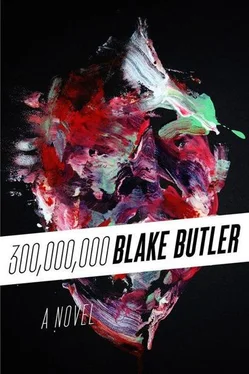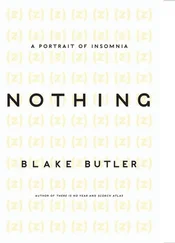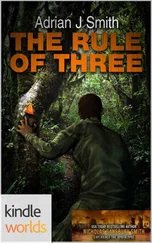They take my ribs and lids. They take the foam around my spirit. I am wider than the room. The house is rising.
They take my hands.
I sat up from the dark into more dark. I felt my wife beside me. I knew her body like my own. She was very slim. We were in a room I did not recognize, though I could see only outlines.
I touched my wife’s face. Where I touched her face her face touched my fingers and remained. I didn’t need to say anything. There wasn’t anything to say. The world held on around us. No sound.
I wanted to go on like this the rest of my life. Now that I had found it I could not remember any other feeling.
As if to mark this thought, the dark around us began to move. It peeled the room back, covered my recognition over, filled the space. And just as quickly she was disappeared again into anything. And the dark was not a room again but just the endless shapelessness. I could not stop it.
It did not wish to be stopped.
I open my eyes and I am my wife. I am standing at a mirror.
The reflection is all there is — every inch of the world covered over with the flat smooth surface, endless miles. Mirrors line the faces of the buildings, of the ground, the sun and planets, the sky itself, the light itself.
My wife is wearing the dress I buried her in, the same dress she was wearing when we were wed. Her face is covered.
I feel her breathe. I feel her body spread throughout the edgeless reflection coursing.
I try to think inside her mind; to feel there what had been in her always; what she believed in, what she remembered of herself, of us, of the rooms she walked in while I wasn’t with her, of the feeling of the darkness of the dirt as it was filled in over her head by men in daylight paler than any I remember.
And where her memory was is now only more mirrors. The glass encased every inch of those mnemonic miles as well, the rooms and light she wore within her covered over in it, white forever, no dream, no face remained. More nothing but the idea of her carried in me disappearing.
To feel her even this way is enough. Even having nothing left in all of it, it is warm and close, a wide white landscape beyond the necessity of feeling or understanding. Even erased, her reflection fills my mind, coats it open without image, eye, or word.
I don’t want it to ever end — this grace, ageless and shapeless — and so, immediately, it does.
The mirrors fall away onto the space behind them, revealing nothing.
The space behind the reflection wore so wide I couldn’t see it or feel it. I couldn’t remember it. It grew in around me and became me. In hidden instants then the heat I could not remember filled the day with light, inside which I could become anything; I was the trees the dirt had birthed out from our mess; I was the egg inside a bird earning its color in noiseless; I was all the human hair that had not grown; the shoulder blades and the ring fingers; I was the ring around each wish. Each body I became I had been always and inside it there it felt like land, a mutual darkness laid awaiting under skin, days beginning as they ended, all terrain blank; I was the bulbs left on to burn out in no terror; I was the wires; I was the absence of all language following our last words as the breath was pulled out from us; I was the trachea and pelvis turned to mud, the silent days in counting lost as what had always filled us sloshed to flood and crest and crash against the face of what we’d been under the eras screwed and screwing.
I could suddenly then feel people crowding around me, dragging at me, tugging at me, hoisting me up. All directions were the same direction. The light surrounding filled with sound: sirens and buzzsaws and gunfire; tanks and shrieking, massive flames. In every voice I heard among the thrall I heard every other word I knew at once also repeated at the same time. I could no longer tell if my eyes and mouth were closed or open, my skin the ground’s skin or yours or ours, what reflected or reflecting, a razing light or one that flourished. Where we had begun this field of fact and error to come alive in death and fill our lives inside the space then I could not feel anything; where even having understood flesh as singular and smeared the order of the bodies into cream around a wish, there was still in this eternity a window, a worm in me wishing for no way out, the make of where each place ends touching the next one even just as being full of all our lives, formed to be because it is. Our dream pressed and pressed unending between the nothing against all.
I close my eyes and open my eyes and I am standing in the room again, above the woman, who I no longer recognize from anyone. There is no one else but me and her there in the room. I appear reflected in the mirrors now and no one else. I look like me as I remember me.
I gather the remainders of the woman. I carry her and place her in a closet. I wash the blood off the floor and off my hands. I wash the mirrors.
There are many more rooms in the house than I remember. The halls go on longer than they should considering the size I remember the house as. There are several floors, each of different lengths and widths of rooms and often windows looking out onto nothing. Most of the rooms are removed of what stuff I can remember having been there or would imagine being there in the room now to dress it as a room would often be in my home or others’ homes. I do not feel disoriented. I feel no time.
In one room, I find a screen wired into a black box. It could have been any of the rooms but it is this one.
The screen is about as big as the face of the bed in the bedroom I grew up in.
The screen is on. It glows a low white. On the floor beneath it, there is a plastic container full of more tapes than I can count, each black along its spine and hand-labeled with unique numbers.
Fixed to the wall beside the TV is a phone. The phone is the same white as the screen.
I pick one tape up and shake it and hear nothing; I feed the tape into the black box; it doesn’t need me to press play.
On the tape I see the image of a woman seated wearing white inside a room; she is staring head on into another TV with the screen all white. She’s not moving; neither am I. It continues like this until the tape ends without occurrence, and the tape ejects itself, and the screen goes dark.
I take the tape out. The casing is warm, as if it wishes to release smoke.
I try again to open my eyes to see if my eyes had been closed all this time and didn’t realize, but my eyes remain the same.
The number printed on the tape’s face resembles my handwriting, I think, though my script is childish, and could be anybody’s.
I lift the receiver of the phone. There is no tone. The buttons burn my fingers. I press the buttons hard.
The phone doesn’t ring. I stand and wait and look along the white of the walls of the room. I love the silence. I smile and wait and hold the phone and hold the tape against my chest, thinking the number over and over. There is no breathing.
This is a process.
After several minutes waiting I hear a soft voice say my name. It is unclear if the voice is a woman or a man, young or old, someone I knew or whose. I know the name is mine but I can’t answer. I mean my mouth won’t, nor will my mind. I mean while I am on the phone I can’t remember seeing anything about the house or room or air there all around me, as if my vision is required to do the hearing. I try to think of how I’d ever moved my mouth or made sound or gesture ever.
The other end hangs up. Or rather: they won’t talk again, no matter what I say after that, but the phone is there against my face.
I hang up myself and try to call the number back but there’s no answer.
I turn around and face the screen. I take another tape; I put the tape inside the machine; it doesn’t need me to press play.
Читать дальше












